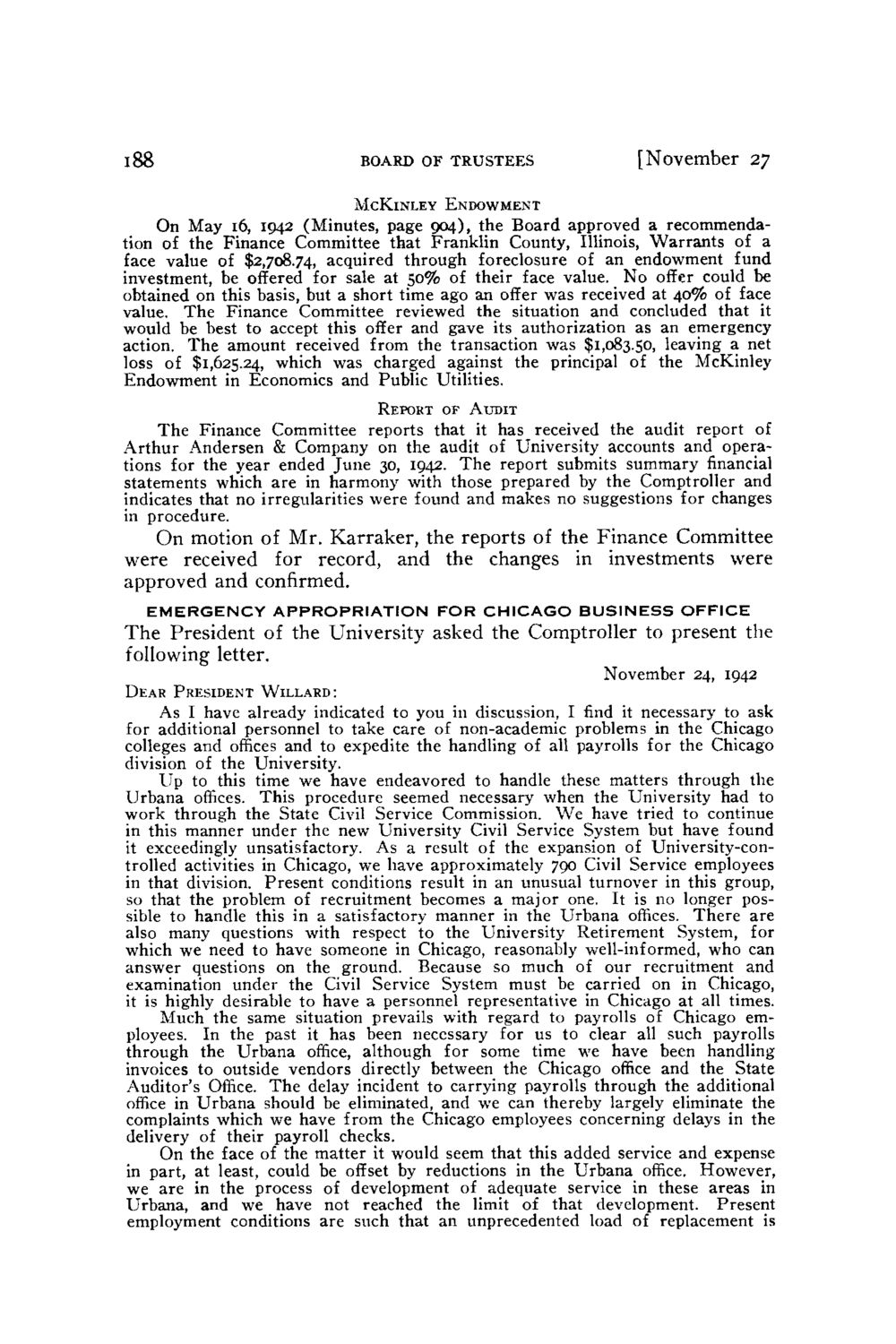| |
| |
Caption: Board of Trustees Minutes - 1944
This is a reduced-resolution page image for fast online browsing.

EXTRACTED TEXT FROM PAGE:
188 BOARD O F T R U S T E E S M C K I N L E Y ENDOWMENT [November 27 On May 16, 1942 (Minutes, page 904), the Board approved a recommendation of the Finance Committee that Franklin County, Illinois, W a r r a n t s of a face value of $2,708.74, acquired through foreclosure of an endowment fund investment, be offered for sale at 50% of their face value. No offer could be obtained on this basis, but a short time ago an offer was received at 40% of face value. The Finance Committee reviewed the situation and concluded that it would be best to accept this offer and gave its authorization as an emergency action. T h e amount received from the transaction was $1,083.50, leaving a net loss of $1,625.24, which was charged against the principal of the McKinley Endowment in Economics and Public Utilities. REPORT OF A U D I T T h e Finance Committee reports that it has received the audit report of A r t h u r Andersen & Company on the audit of University accounts and operations for the year ended J u n e 30, 1942. T h e report submits summary financial statements which are in harmony with those prepared by the Comptroller and indicates that no irregularities were found and makes no suggestions for changes in procedure. O n m o t i o n of M r . K a r r a k e r , t h e r e p o r t s of t h e F i n a n c e C o m m i t t e e w e r e r e c e i v e d f o r r e c o r d , a n d t h e c h a n g e s in i n v e s t m e n t s w e r e approved and confirmed. EMERGENCY APPROPRIATION FOR CHICAGO BUSINESS OFFICE T h e P r e s i d e n t of t h e U n i v e r s i t y a s k e d t h e C o m p t r o l l e r t o p r e s e n t t h e following letter. November 24, 1942 DEAR PRESIDENT W I L L A R D : As I have already indicated to you in discussion, I find it necessary to ask for additional personnel to take care of non-academic problems in the Chicago colleges and offices and to expedite the handling of all payrolls for the Chicago division of the University. Up to this time we have endeavored to handle these matters through the Urbana offices. This procedure seemed necessary when the University had to work through the State Civil Service Commission. W e have tried to continue in this manner under the new University Civil Service System but have found it exceedingly unsatisfactory. As a result of the expansion of University-controlled activities in Chicago, we have approximately 790 Civil Service employees in that division. Present conditions result in an unusual turnover in this group, so that the problem of recruitment becomes a major one. It is no longer possible to handle this in a satisfactory manner in the Urbana offices. There are also many questions with respect to the University Retirement System, for which we need to have someone in Chicago, reasonably well-informed, who can answer questions on the ground. Because so much of our recruitment and examination under the Civil Service System must be carried on in Chicago, it is highly desirable to have a personnel representative in Chicago at all times. Much the same situation prevails with regard to payrolls of Chicago employees. In the past it has been necessary for us to clear all such payrolls through the Urbana office, although for some time we have been handling invoices to outside vendors directly between the Chicago office and the State Auditor's Office. T h e delay incident to carrying payrolls through the additional office in Urbana should be eliminated, and we can thereby largely eliminate the complaints which we have from the Chicago employees concerning delays in the delivery of their payroll checks. On the face of the matter it would seem that this added service and expense in part, at least, could be offset by reductions in the Urbana office. However, we are in the process of development of adequate service in these areas in Urbana, and we have not reached the limit of that development. Present employment conditions are such that an unprecedented load of replacement is
| |